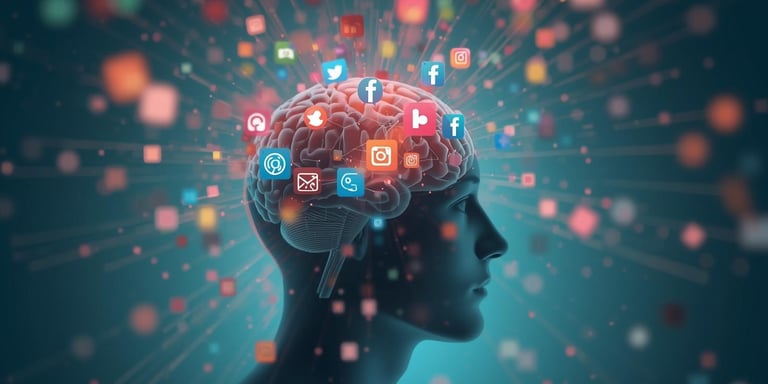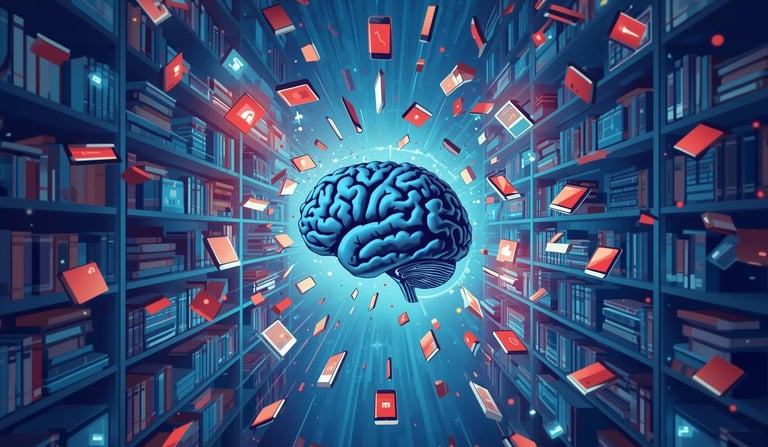The Cognitive Impact of Digital Anxiety
Understanding Digital Anxiety and Its Impact on Cognitive Behaviour. Part 2
Gajanan L. Bhonde
9/7/20258 min read


Understanding Digital Anxiety
Digital anxiety refers to the psychological distress that arises from the use of digital technologies, particularly in an environment characterized by constant connectivity and an overwhelming flow of information. In contemporary society, where smartphones and social media platforms dominate daily life, the prevalence of digital anxiety has surged. This phenomenon manifests in various forms, including stress, restlessness, and a persistent sense of unease concerning one’s online presence and engagements.
One of the primary psychological factors contributing to digital anxiety is the fear of missing out (FOMO). FOMO drives individuals to remain perpetually connected to their devices, fearing that they may miss important updates, social interactions, or trending information. This continuous engagement creates a paradoxical situation where the technology designed to enhance communication leads to feelings of isolation and anxiety. The pressure to stay constantly updated can exacerbate existing mental health issues or give rise to new ones, ultimately impacting cognitive function.
Furthermore, the feeling of being 'always on' can lead to cognitive overload—an overwhelming influx of information that makes it challenging for individuals to focus and process effectively. Constant notifications, alerts, and messages can fragment attention and diminish the ability to engage in deep, meaningful tasks. This disruption of cognitive processes is an essential factor to consider, as it highlights the need for awareness and management of digital anxiety in our technology-driven lives.
Understanding digital anxiety within this broader context underscores its significance in today’s society. As digital interactions become increasingly integral to everyday life, acknowledging and addressing these psychological factors is crucial for maintaining mental well-being and cognitive functionality. By examining the root causes of this condition, individuals can take steps to cultivate healthier relationships with technology.
The Influence of Digital Distractions on Attention Span
In today's rapidly evolving digital landscape, distractions have become ubiquitous, significantly impacting our collective attention spans. Research suggests that digital interruptions, such as frequent notifications from mobile devices and real-time updates from social media platforms, can lead to a fragmented focus on tasks. The cognitive load imposed by these digital distractions demands that individuals constantly shift their attention, making sustained focus increasingly challenging.
Cognitive scientists have been investigating the implications of this phenomenon on human attention. Studies indicate that the average attention span has notably decreased in recent years. One research effort found that participants exposed to frequent digital alerts performed significantly worse on attention retention tasks compared to those in a distraction-free environment. The findings lend credence to the idea that the continuous flow of information serves as a cognitive burden, impairing not only our concentration but also our overall productivity.
Moreover, multitasking, often driven by the need to stay updated on various digital platforms, further dilutes our ability to focus. While many individuals believe that multitasking enhances productivity, cognitive research consistently demonstrates that it can lead to decreased efficiency and increased errors. The brain's capacity for processing information simultaneously is limited; thus, frequent task-switching becomes a significant barrier to completing complex cognitive tasks effectively.
Furthermore, the neuropsychological effects of constant digital engagement contribute to a decrease in attentional control. As individuals become habituated to instant gratification and rapid content consumption, their threshold for focusing on singular tasks diminishes. What emerges is a scenario where information overload not only threatens our ability to maintain focus but also adversely affects our cognitive health. Addressing the cognitive consequences of digital distractions is essential for reclaiming our capacity for sustained attention in an increasingly interconnected world.
The Relationship Between Digital Anxiety and Memory
Digital anxiety, characterized by overwhelming feelings triggered by the constant influx of information and communication through digital devices, has significant implications on memory retention and recall. Various studies have revealed that a heightened state of cognitive overload, often a product of digital anxiety, can lead to diminished memory performance. When individuals are bombarded with notifications, emails, and social media updates, their cognitive resources become stretched, leading to reduced focus and impaired ability to process information effectively. This overwhelming cognitive state can interfere with encoding new memories, weakening both short- and long-term retention.
Research indicates that the incessant multi-tasking common in digital environments makes it increasingly difficult for individuals to commit information to memory. When attention is divided, the brain struggles to consolidate new experiences, which are essential for forming lasting memories. Moreover, the anxiety stemming from an obligation to remain constantly connected can further obstruct cognitive processes, resulting in lapses of attention, increased forgetfulness, and a decline in overall memory function.
To combat these adverse effects, several strategies can be employed to enhance memory performance in an era marked by digital distractions. One effective approach is cognitive offloading, which involves using external tools, such as notes and reminders, to alleviate the burden on working memory. This strategy allows for better focus and the ability to prioritize essential information. Additionally, the practice of mindfulness techniques, such as meditation and deep breathing exercises, can promote mental clarity and enhance attention. By nurturing a non-reactive state of presence, individuals can develop improved cognitive resilience against the detrimental impacts of digital anxiety on memory.
Impact on Decision-Making
Digital anxiety is a phenomenon that stems from the constant exposure to information and the myriad of choices available in today’s digital environments. This state of heightened stress can significantly compromise decision-making and problem-solving abilities. One key aspect of this impact is cognitive overload, which occurs when individuals are inundated with excessive information, leading to difficulty in processing and evaluating their options.
In modern times, the overwhelming number of choices available online can result in what is commonly referred to as "paralysis by analysis." When confronted with numerous alternatives, individuals may struggle to make any decision at all. This can stem from the fear of making the wrong choice or the inability to weigh the pros and cons effectively due to mental fatigue. Consequently, vital decision-making processes are hindered, which can lead to increased anxiety and indecision.
Timely decision-making is another critical area affected by digital anxiety. The pressure to make quick decisions in a fast-paced digital world can exacerbate feelings of anxiety. Individuals may often feel rushed to respond to emails, social media notifications, or online inquiries, which can negatively impact their ability to analyze situations thoroughly. This urgency may lead to impulsive choices that do not align with long-term objectives.
It is essential to employ practical methods to enhance decision-making capabilities in this digital context. Techniques such as setting limits on information intake, creating structured decision-making frameworks, or even engaging in mindfulness practices can help alleviate some of the cognitive burdens associated with digital anxiety. By adopting these strategies, individuals can better navigate the complexities of the digital landscape while maintaining their cognitive faculties intact.
Mental Health and Digital Anxiety: The Unseen Connection
Digital anxiety has emerged as a prominent issue in the contemporary landscape, especially as technology continues to permeate every aspect of daily life. This form of anxiety is often characterized by constant worry about digital interactions, including social media performance, online privacy, and the fear of missing out (FOMO). Such persistent concerns can significantly impact an individual’s mental health, leading to the exacerbation of prevalent conditions such as anxiety disorders and depression.
Research indicates that individuals experiencing digital anxiety may be at a heightened risk for developing mental health challenges. For example, a study published in the Journal of Anxiety Disorders highlighted a strong correlation between excessive social media usage and increased levels of anxiety and depression. The findings reveal that constant engagement with digital platforms can create a cycle of negative thoughts and feelings, ultimately leading to a decline in psychological well-being.
Real-life examples further illustrate the profound effects of digital anxiety on mental health. Many individuals report feeling overwhelmed by the pressure to maintain an idealized online presence, leading to feelings of inadequacy and increased anxiety. One case study documented the experiences of a young professional who, overwhelmed by the need to respond to work emails outside of office hours, developed extreme anxiety that affected her personal relationships and overall quality of life. This exemplifies how digital interactions can contribute to a spiral of stress and, potentially, long-term mental health issues.
The connection between digital anxiety and mental health is complex and multifaceted. While technology has undoubtedly provided countless benefits, it is essential to recognize the hidden costs to individuals' psychological well-being. Addressing digital anxiety through mindful usage of technology, therapy, and support systems may mitigate its adverse effects on mental health.
Coping Strategies for Digital Anxiety
In the modern digital age, many individuals find themselves experiencing digital anxiety, which can manifest as overwhelming feelings of stress related to constant connectivity and information overload. It is essential to implement effective coping strategies to manage this form of anxiety. One of the most beneficial techniques is to set clear boundaries with technology. This approach involves designating specific times for device use and establishing technology-free zones in your home, such as the bedroom or dining area. By doing so, individuals can foster a more balanced relationship with their devices and minimize distractions during crucial moments of their day.
Another effective strategy is to embrace digital detoxes, which entail periods of intentional disconnection from all forms of digital media. Scheduling regular breaks, whether for a few hours or an entire day, can result in significant improvements in mental clarity and emotional well-being. During these detox periods, individuals can engage in offline activities such as reading, journaling, or enjoying nature, ultimately providing respite from the relentless pace of the digital world.
Incorporating mindfulness practices into one's daily routine is another valuable method for mitigating digital anxiety. Mindfulness encourages individuals to focus on the present moment and cultivate awareness of their thoughts, feelings, and surroundings. Techniques such as deep breathing, meditation, or even short mindful walks can ground individuals in the present, reducing feelings of overwhelm and anxiety. Furthermore, these moments of mindfulness can foster greater clarity, enabling individuals to recognize when technology is becoming overpowering and to take necessary steps towards moderation.
By integrating these coping strategies—setting boundaries, embracing digital detoxes, and adopting mindfulness—individuals can significantly improve their cognitive health and overall well-being. Each strategy empowers individuals to take control over their digital experiences, ultimately leading to a more balanced and productive life.
Conclusion: Navigating the Digital World Mindfully
In an era characterized by constant connectivity and overwhelming information, the impact of digital anxiety on cognitive health cannot be overlooked. Throughout this discussion, we have highlighted the various facets of digital anxiety, including its causes, symptoms, and consequences. By recognizing these elements, individuals can better understand their experiences and navigate the digital landscape more effectively.
It is vital to acknowledge that the digital world offers significant benefits, but it also poses challenges that can negatively influence mental wellness. As our lives become increasingly intertwined with technology, the need for mindful engagement has never been greater. This involves being aware of how our digital interactions affect our thoughts and emotions. By adopting a deliberate approach to technology use, individuals can foster healthier relationships with their devices and the information they consume.
Strategies to mitigate digital anxiety include setting boundaries around screen time, practicing digital detoxes, and cultivating a supportive online environment. Moreover, fostering habits such as mindfulness meditation and regular physical activity can greatly enhance cognitive resilience. By prioritizing these practices, individuals can create a balanced approach to technology that promotes not only cognitive health but also overall well-being.
Ultimately, navigating the complexities of the digital age requires a conscious effort to manage our interactions with technology. As we continue to explore digital landscapes, being attentive to our mental health should remain a priority. By committing to mindful practices and seeking healthy habits, we empower ourselves to engage with the digital world in ways that support our cognitive vitality and emotional health as we shape our modern lives.












